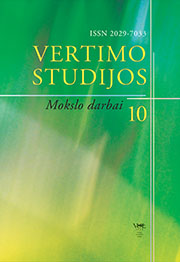DIALEKTO VERTIMAS GROŽINĖJE LITERATŪROJE. ATVEJO ANALIZĖ
TRANSLATING DIALECT IN FICTION: A CASE STUDY
Author(s): Nijolė Maskaliūnienė, Viktorija SemėnaitėSubject(s): Theoretical Linguistics, Philology, Translation Studies, Theory of Literature
Published by: Vilniaus Universiteto Leidykla
Keywords: Translation; Dialect in fiction;
Summary/Abstract: The article focuses on the translation of dialect in fiction. Many authors regard it as one of the most complicated issues in translation because the translator has to make a choice between translating it as a language in its own right or make an attempt to make the translation sound “dialectal”. In many cases dialect serves specific functions of characterising protagonists, creating a special atmosphere or setting in the Source Text. The translator’s role is to transfer these functions into the Target Text for a reader of the translation. This article aims to identify the ways in which dialogue is translated from English into Lithuanian in the example of Burnett’s book for children, The Secret Garden, with a special focus on its functions in the Source Text. This book was chosen because critics almost unanimously claim that the Yorkshire dialect employed in it serves as a protagonist itself, therefore its role is very important for the development of the narrative, and, as such, cannot be ignored in translation.
Journal: Vertimo studijos
- Issue Year: 10/2017
- Issue No: 10
- Page Range: 192-208
- Page Count: 17
- Language: Lithuanian

